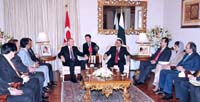President Zardari Ephasis on conclusion of Pak-Turkey trade agreement
ISLAMABAD, Nov 21 (APP): President Asif Ali Zardari Wednesday stressed the need for fast tracking the conclusion of Pakistan-Turkey Preferential Trade Agreement (PTA) and creating facilitative mechanisms and opportunities for investors and private sectors of the two countries to bolster bilateral trade to new heights and achieve mutually agreed trade target of $ 2 billion. The President welcomed the recent suggestion from the Turkish side to include mutual concessions within the ambit of the PTA. “It is high time to translate the gains of the excellent political relations between the two countries for qualitative up-gradation in our bilateral economic and commercial ties”. The President said this during his meeting with Turkish Prime Minister Recep Tayyip Erdogan at the Aiwan-e- Sadr today on the sidelines of Eighth D-8 Summit.
Turkish Prime Minister was assisted by Ahmet DAVUTOGLU, Foreign Minister, Omer CELIK MNA, Vice Chairman, AK Party, Nukhet HOTAR, MNA, Vice Chairman AK party, NurettinCANIKLI, MNA, parliamentary group Deputy President, AK, Party, Yalcin AKDOGAN, MNA, advisor to Chairman, AK Party, Cevdet ERDOL, MNA, AK Party, Mr. Mehmet CEYLAN, Deputy Minister of Development, Turkish ambassador Mustafa Babar Hizlan and other senior officials. From Pakistan side, those who attended the meeting included among others Syed Yusaf Raza Gilani, former Prime Minister, Hina Rabbani Khar, Foreign Minister, Dr. Abdul Hafeez Sheikh, Finance Minister, Mian Manzoor Ahmed Watto, Minister of Kashmir Affairs and Gilgit-Baltistan, Qamar Zaman Kaira, Minister for Information & Broadcasting, M. Salman Faruqui, Secretary General to the President, Jalil Abbas Jilani, Secretary foreign affairs, Governor State Bank and other senior officials.
Briefing about the meeting, Spokesperson to the President senator Farhatullah Babar said that the two leaders held wide-ranging discussions on bilateral, regional and international issues, peace process in Afghanistan and the situation in Middle East.
The President welcomed Recep Tayyip Erdogan’s visit to Pakistan to attend D-8 Summit and expressed hope that the summit with its distinct trade promotion focus would further energize economic ties within the D-8 family. The President said that by hosting 8th summit of D -8 countries, we commit our complete support to the vision of Muslim solidarity conceived by late Prime Minister Erbakan. He said that D-8 holds great potential to build on the synergies that exist between the 8 leading Muslim member states, adding that Summit has gained further importance as it was taking place at a time when the Muslim World was facing unprecedented challenges from North Africa to Afghanistan. The Spokesperson said that President stressed for a proactive role to ensure that this process of change and transformation is materialized in a peaceful manner and without causing disruptions in Muslim societies. On situation in Middle East, the President said that Pakistan appreciates the democratic transformations in the Middle East and the broader Islamic World and believed that this transformation should be peaceful without resorting to violence, without external interference and in accordance with the aspirations of the people.
The President expressed support and solidarity with Turkey on grave incident of shelling across its border from Syrian side in which Turkish citizens lost their lives.
The President lauded Turkey’s constructive role in Afghanistan and the valuable contributions under the ambit of the trilateral mechanism as well as the Istanbul process. The President urged the need for the two countries to intensify cooperation, both bilaterally as well as under the trilateral mechanism to support an Afghan-led and Afghan-owned process of reconciliation. The President said that he was looking forward to attend Trilateral Summit in Ankara next month.
On drug trafficking, the President said that both Turkey and Pakistan should play its proactive role and sensitize the world about the close linkage between narco-trade and terrorism in the region. Narco-trade was a great source of financing for terrorism, he said and added that Afghanistan would remain unstable and cause instability in the region and beyond unless immediate remedial measures are taken to eradicate narcotic drugs from the two leaders expressed satisfaction on the current state of bilateral ties and agreed that Turkey and Pakistan enjoy exemplary relations which go beyond the governments and are rooted in common history, culture and ethos of our people. They also urged for early implementation of bilateral agreements signed between the two countries, which they hoped, would further deepen bilateral relationship in all fields. The President during the meeting invited Turkish investment in key sectors such as infrastructure, housing, engineering, energy, agriculture, telecommunications and mining and said that it was encouraging that private sectors of the two countries are collaborating in the energy, construction, food processing and rubber industries. On Gul Train, the President said that Pakistan was keenly interested in the project and thanked the Turkish Prime Minister for his personal interest in Gul Train project.
The President expressed hope that The “Gul train” project would revolutionize cargo and transit facilities between our two countries and urged the need to formulate speedy border crossing formalities, harmonize customs procedures and generate cargo by larger involvement of the private sector to make the project a success. He said that Pakistan and Turkey together with Iran needed to take all the necessary steps to fast track the finalization of the key issues in the project.
Turkish Prime Minister Recep Tayyip Erdogan said that Pak-Turkey bilateral relationship would grow with every passing day and touch new heights in the near future.
He appreciated the huge sacrifices made by Pakistan in the fight against militancy and terrorism and assured all out support of the Turkish government in this regard.
The Prime minister urged for close bilateral cooperation at various levels to further strengthen bilateral relations particularly trade and investment ties.






